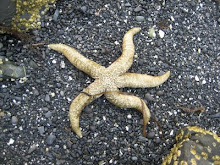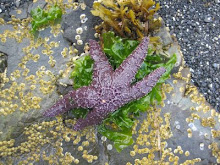Over the last 20 years, a very important part of my jobs has been to read the waves. In fact, reading the waves would probably be the most foundational necessity and requirement of my job. This was important for the safety of my passengers. As a dive instructor, I would look at the surf to determine how safe the entry would be. As a dive boat captain I would study the waves to make sure that the dive tour could be done safely and be enjoyable. As a delivery captain I would constantly monitor the wave crests and troughs to insure that no damage would occur on the way to the destination. Mariners study waves!
I remember in Guam there was a mushroom shaped rock at the mouth of Apra harbor. You could immediately tell the sea state at the mouth of the harbor by seeing how high the swell would wash up on the rock. All of the skippers in Apra harbor knew that the mushroom rock was accurate. The problem was seeing the rock. If you left too early in the morning it was too dark. And then there was the problem of fog. Even on a clear day it was hard to see the rock clearly because of the distance from the harbor.
Every mariner needs a good pair of binoculars. These are my trusty binoculars that I bought back in 1992. They have been with me to Indonesia, Micronesia, and the Philippines. To Japan and all the way through the Aleutians to the Bering Sea. Also, on all of the deliveries I did from Sitka, Alaska to New York City.
Other than studying waves, I used my binoculars on drift dives as a dive boat captain. As the divers would drift with the current, I would keep their rising bubbles in view so that I would meet them when they came to the surface at the end of their dive. In 1994, while on a family vacation to the exotic Rock Islands in Palau, I saw first hand what disasters can occur during a drift dive. One day while on Palau, our family rented a skiff and operator to take us out through the breathtaking scenery of the Rock Islands.
A Map of the location of Palau in the western pacific.
The Rock Islands
Our family on vacation in Palau.
So as our family took a small boat to snorkel and explore the Rock Islands, little did we know that near the neighboring island of Peleilu, 6 Japanese divers had started doing a drift dive.
As the current moved them along one direction, the boat operator's motor killed and he couldn't get the engine started. The wind was blowing the opposite direction and the operator lost view of the raising bubbles. When he finally got the motor started he was quite a distance from the divers. He went back to the dive shop and told the authorities who then got a search party organized. Unfortunately, the divers perished before they were found. Even with 7 mil wetsuits on, the divers died from hypothermia.(they got so cold that they drowned) Some of the divers were never found. One of the divers who survived about 36 hours had written notes on her diving slate. She wrote the times that she saw planes or boats pass by but that didn't see her. Even in 87 degree water, eventually your body temperature will drop until you perish from hypothermia. This whole drama took place while our family was playing and enjoying the rock islands near by.
Right click on the article for easier reading.
Another experience that motivated me to get my good binoculars in the first place happened in 1992 when a diver that came into the dive shop frequently told me that he had run out of gas at the mouth of Apra Harbor and was drifting south. He told me that he saw me going by on the way to the dive site that morning but that we did not see him. Luckily he was found by some fishermen. Right after that I ordered my binoculars. They were top of the line and expensive but they have served me well over the years. I told myself that day that I would get the tools to be an instrument of rescue for the Lord.
One time in Truk while captaining the Thorfin, some divers went off to dive the Shinkoku Maru. From the pilot house the purser and I saw them get caught in a squall. The purser was so worried that he was going to call the Coast guard. I was able to see them with my good binoculars and saw that they made it through the squall safely and avoided a needless call to the Coast Guard.
May we always prepare ourselves to be instruments of rescue . . .
This photo was taken while reading the waves while delivering one of the 150 passenger
catamarans a couple of miles seaward of Fort Lauderdale, Florida
during a squall.
Psalms 89:9
Thou rulest the raging of the seas,
when the waves thereof arise,
thou stillest them.
Here is a poem I wrote about reading the waves.
11-1-2008
By Capt. J. Brad Chapman
As I stand at the helm and gaze out on the calm,
There's something intriguing to me,
That the subtlest breeze blowing over the deep,
Can change the kind face of the sea.
From glassy to ripple, and ripple to wave,
The movement of air is so slight.
But little by little the wind gathers strength,
Till breakers reach dangerous heights.
Many a seaman have awoke to the dawn,
Of a beautiful, calm, cloudless day,
Only to find as they bask in the sun,
A storm building right in their way.
They'd let down their guard as the sea state was mild,
they'd forgotten how harsh it could be,
And now with tempestuous winds gaining strength,
they'd meet the wroth face of the sea.
With sail unreefed and hatch unsecured,
preparations undone or in haste,
the sea doesn't wait for convenience or ease,
and their caught in the storms fierce embrace.
The trials of life are like strengthening storms,
we don't notice the threat till too late,
cause we sail content on the calm seas of life,
and we sit back and seal our fate.
And so with the thunderous waves pounding in,
we forget in the midst of our strife,
that the tempest began with just one gentle breeze,
and we learn a great lesson of life.
We learn that a lifestyle of comfort and ease,
makes us soft, and complacent, and weak.
We need that brisk wind blowing stiff in our face.
to keep us alive at our peak. . . .
So greet the wild gail and square up to the wind,
prepare for the storms that might be.
From glassy to ripple, and ripple to wave,
Respect the kind face of the sea.
































